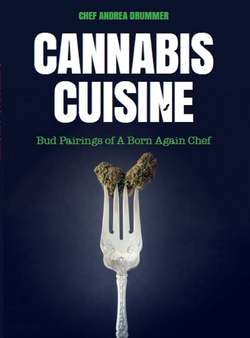Читать книгу Cannabis Cuisine - Andrea Drummer - Страница 18
На сайте Литреса книга снята с продажи.
ОглавлениеThere is a power to the memory of food that verges on the beautiful. It can elicit a smile, a grimace, even a tear. Food memory—better than a time travel rocket—can spin you back decades, to when you sat shoulder-to-shoulder with a dining partner. It can teleport you to the crook of a tree, biting into the ripened flesh of a mango. It can, in a half second, fill your mouth with a stiff mound of cold grits, its grains trapped in spaces between your teeth.
A person can live a lifetime of curiosity based on food memory (remember Proust’s Madeleine?) A single bad food memory can be the death of future opportunity. I think of food memory as the culinary Achilles heel. It has the power to deprive us of new experiences, and most of the heels, in my opinion, have to do with vegetables.
How often have you seen a friend cringe at the mention of spinach, beets, or peas? Or heard a mate’s nervous voice pleading, “oh, I don’t eat…” Predicated on a ghastly occurrence, they’ve sworn off the possibilities of all …whatevers! As a professional chef, the very idea makes me moan and challenges me to create something for this person to offer them a renewed and positive experience.
At a time, my particular Achilles heel was the Brussels sprout. Eyes wide open; in memory, I can revisit my mother’s old kitchen circa 1986. We owned a pale yellow refrigerator that was often filled with frozen things: bags of succotash, green peas, petrified okra, spinach, and yes, Brussels sprouts. She’d remove a bag and place it atop the counter to allow it to defrost. Hours later, I would sit contemplating the mound of mush, begging to know, “why?”
Even at a young age, I was acutely aware of and curious about the distinct difference between the frozen bags that doubled as ice packs and the sun-ripened fields of vegetables lining the back roads of my mother’s hometown of Statesboro, GA. I suppose, however, that having experienced the juxtaposition of the two worlds kept me curious enough to give every food a second, third, or fourth chance. The combination of traveling, living in diverse communities, and always keeping an open mind promised me a new experience with the Brussels sprout.
They were eventually reintroduced to me, cooked to just the appropriate give and resting in a warm bath of butter. Later, in Philadelphia, I learned how to roast them with garlic and polish them with olive oil, pine nuts, and aged balsamic. And in New York, I explored a pan-seared version with a white wine and Dijon sauce. Not only does every negative food memory deserve a second chance, but you, too, deserve a renewed, positive experience.
Most food memories are created in our youth under limited circumstances. With greater resources and a world of thriving diversity, we now have magnificent opportunities to create new food memories. Remember, with a slight hint of Berber spice, a rub of garam masala, or the perfect smoke of Jamaican jerk, your culinary Achilles heel can become a welcomed part of a dining excursion.
